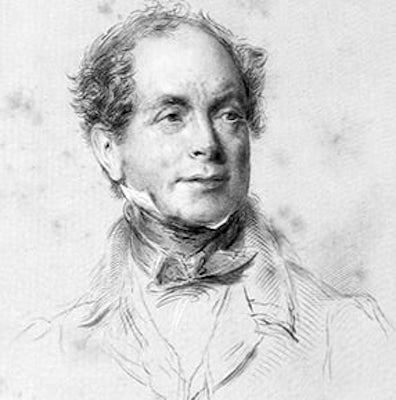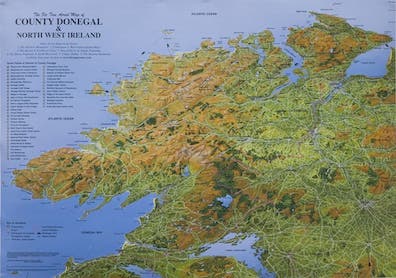Thomas Moore (1779-1852) published The Minstrel Boy
in 1813 as part of his ongoing Irish Melodies project.
It proved very popular in his day (he himself became known as
"the minstrel boy") and has remained so. The anthem features a
sword (the young singer has gone off to war to defend the
freedom of his people) and a harp (the symbol of Ireland),
both of which appear in Circe:
"(Henry
Flower combs his moustache and beard rapidly with a
pocketcomb and gives a cow's lick to his hair. Steered
by his rapier, he glides to the door, his wild
harp slung behind him....)":
The Minstrel-Boy to the war is gone,
In the ranks of death you'll find him;
His father's sword he has girded on,
And his wild harp slung behind him.
"Land of song!" said the warrior-bard,
"Tho' all the world betrays thee,
One sword, at least, thy rights shall guard,
One faithful harp shall praise thee!"
The Minstrel fell!—but the foeman's chain
Could not bring that proud soul under;
The harp he lov'd ne'er spoke again,
For he tore its chords asunder;
And said, "No chains shall sully thee,
Thou soul of love and bravery!
Thy songs were made for the pure and free,
They shall never sound in slavery."
Burke enters the newspaper office in Aeolus with
Stephen Dedalus in tow just as Lenehan is preparing to deliver
his riddle. He is "tall in copious grey of Donegal tweed,"
and later Professor MacHugh remarks on the "loose ties" that
both he and Stephen are sporting: "You look like communards. /
— Like fellows who had blown up the Bastille, J. J.
O'Molloy said in quiet mockery. Or was it you shot the lord
lieutenant of Finland between you?" The association thus
effected between political revoluion and Donegal—a Gaeltacht
stronghold, and the only Ulster county that opted for
independence in 1922—evidently has lodged in Lenehan's
thoughts and suggested the phrase he tries out in Sirens.
One other detail accounts for his mention of Moore's song.
Burke's name is "euphonious," and he speaks
grandiloquently: "— I escort a suppliant, Mr O'Madden
Burke said melodiously. Youth led by Experience visits
Notoriety." Vivien Igoe observes that William O'Leary Curtis,
on whom he was modeled, "is described as being widely read and
having a pompous, full-mouthed manner of speech." An ardent
nationalist, "O'Leary Curtis was the principal speaker at the
Manchester
Martyrs Commemoration at Bloomsbury Hall, Hart Street,
Manchester in 1902." These revolutionary sympathies and
musical turns of speech, both evoked by Moore's "wild harp,"
combine with Donegal to make Burke the minstrel boy of "the
wild wet west."
The Donegal tweed would be sufficient to explain Lenehan's
mention of the west, but Zack Bowen detects also an allusion
to The Men of the West, a patriotic ballad about the
1798 Rebellion by William Rooney. He
quotes the chorus:
I give you the gallant old West, boys,
Where rallied our bravest and best
When Ireland lay broken and bleeding;
Hurrah for the men of the West!
Nothing in the verses improves much on these dull plodding
lyrics, and the melody lacks all the lyrical beauty of The
Minstrel Boy. Since nothing but the word "West" can be
tied to anything in Ulysses, I find Bowen's suggestion
unpersuasive. Other annotators have taken different views.
Gifford judges that Lenehan "may" be alluding to the song.
Slote, Mamigonian, and Turner declare flatly that he is.
Johnson and Kiberd mention only Moore's song. One thing is
certain: Joyce knew Rooney's patriotic lyrics and detested
them.

